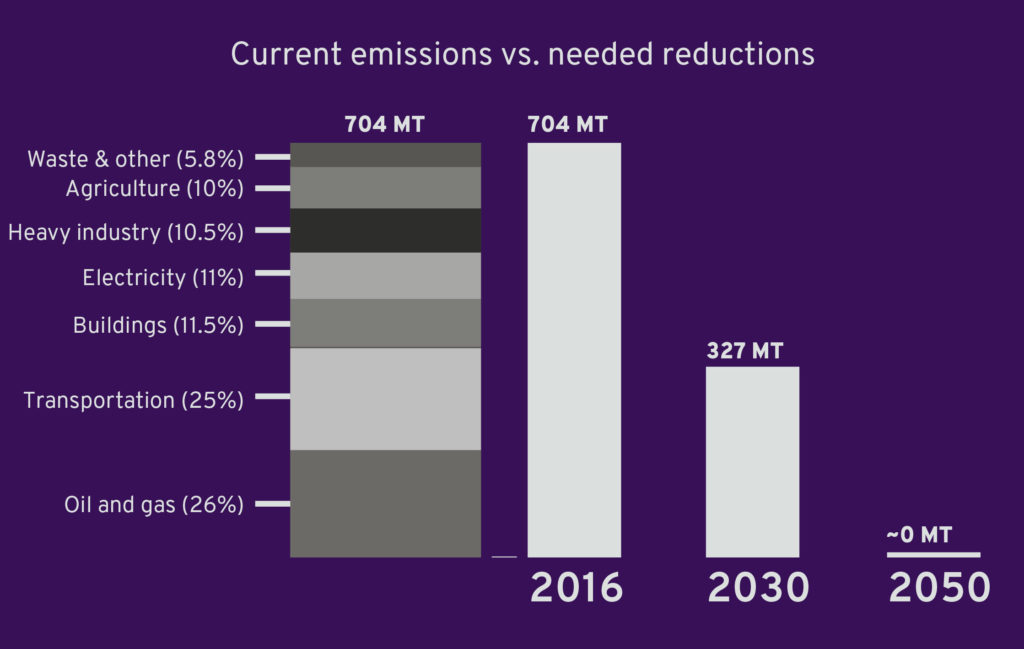A Green New Deal of the North
Climate chaos is upon us. A recent report from the Intergovernmental Panel on Climate Change concluded that preventing climate catastrophe will require “rapid, far reaching and unprecedented changes in all aspects of society”. We need a clear plan to transition away from our current destructive energy and economic systems, which are based in exploitation and extraction, and into systems that are sustainable and just. And we need it now.

This document seeks to demonstrate how Canada can be a leader in creating comprehensive solutions to the climate crisis.
Canada is one of the highest per-capita emitters of carbon dioxide in the world. We’re one of a handful of rich countries that set the technological, economic and social patterns for what the planet’s poor majority see as a good life. We continue to benefit from the massive extraction and burning of fossil fuels. As such, Canada has a triple responsibility to put new ways of doing things into practice. Through bold action, we can transform the Canadian economy and become a global leader in responsible and sustainable energy production.
This task presents us with a historic opportunity to tackle many of our interlocking problems together, by challenging the exploitative nature of our current economic system. This is the promise of the Green New Deal. Its key insight is that for a climate transition to really work, it has to work for everyone: this means redistributing wealth and resources away from harmful activities and those who seek to profit from them, and giving regular people a say in who wins and loses as we move away from fossil fuels.
The just transition isn’t just from fossil fuels to renewables. It means removing the economic incentives and structures that got us to this crisis point, so that we don’t fall back into the same trap in the future.
And while everyone will benefit from a Green New Deal, the transition must address the structural inequalities and improve lives in communities marginalized by the current system. A just transition must confront and undermine the xenophobia and anti-migrant sentiment that are the hallmarks of reactionary forces.
We need several transitions:
- from individual and wasteful consumerism, to the communal luxury of free time and high quality public spaces for all to enjoy;
- from private ownership to public and cooperative ownership models;
- from authoritarian corporate structures to workplace democracy; and,
- from enclosing the commons to expanding the commons.
In short, from blind faith in the market to a clear vision of a good life for all. To that end, here’s are some key pieces we see a serious version of the Green New Deal in Canada including.
From Now To Next
What are the biggest employment roadblocks today and how do we replace those jobs quickly?
1. A just transition for this generation and the next
Retooling our economy means that all workers in high-polluting sectors would have not only opportunities but long term job security after the transition. It also means that those entering the workforce will have access to decent jobs, not unpaid internships and poverty wages.
- Immediately end fossil fuel subsidies and massively invest in renewable energy, cleanup, reclamation, climate infrastructure and construction
- Pass “polluter pays” legislation to force carbon-intensive emitting industries to pay the true cost of their activities, including to clean up the messes they have left behind
- Jobs guarantee and funded retraining for fossil fuel industry workers
- Ensure all new green jobs are unionized and public, or administered under community-owned or cooperative models, so that profits benefit everyone
2. Make caring work prosperous
Support workers, service workers, and care workers are among the professions with the smallest climate footprints. Expanding the scope of care work and paying those who do it a decent wage will redistribute wealth, fuel climate-friendly economic activity, and improve quality of life in all of our communities.
- Expansion of public long-term care facilities to meet the needs of an aging population
- Raise minimum wages and implement workplace protections and benefits laid out by campaigns like Fight For $15 & Fairness
- Reduce the workweek as wage increases allow, making space for the economic value of informal care work
- Grant full democratic and labour rights, access to services and full immigration status to migrants, who shoulder a disproportionate share of care work
- Introduce universal childcare to set the bar for the value of care sector workers
3. A transportation and logistics overhaul
Getting people and things from place to place is a major source of emissions. Climate science says we need to take every internal combustion engine off the roads by 2030. But how can that process improve rather than degrade the lives of low income people?
- Expanded, fare-free public transportation in cities, accessible zero-carbon intercity high speed rail transportation and a national public bus service
- A fleet of electric vans in every rural area to ensure free or affordable mobility for everyone, supplemented by a cooperatively managed electric-only ridesharing service
- An expanded, zero-carbon Canada Post that provides all deliveries, eliminating the congestion, waste and poor working conditions of redundant services
Defending Our Common Wealth
What are the protections we can set up to prevent ourselves from sliding back again?
4. Equalized services and sovereignty for Indigenous nations
For too long, desperate economic and social conditions have been used as a tool to coerce Indigenous people to accept extraction projects. Those same communities were denied the economic development that was driven by sustained funding for public services (and good quality jobs) in the rest of Canada. Time to flip the script.
- Recognize Indigenous sovereignty and claims to traditional territory and support Indigenous peoples to control use of their own lands.
- Equally fund services now, starting with Jordan’s principle but not stopping until health care, education and other services are as good or better than the rest of Canada
- Implement treaties, UNDRIP, and an end to the termination agenda that seeks to extinguish Aboriginal Title and inherent rights
- Cease and desist any government legal actions or activities supporting fossil fuel extraction efforts
- Invest in locally-owned and controlled green energy on Indigenous territories
5. Affordable green housing for everyone
Canada’s metropolises are suffering a profound housing crisis driven by speculators, while over 10% of Canada’s carbon emissions come from buildings. We can address both – and more.
- Take immediate steps to solve the profound housing crises in Indigenous territories though hyper-efficient, long-term housing
- Construct hundreds of thousands of units of cooperative housing with community space, long term care and childcare facilities built-in
- Develop open source designs for low/zero emissions, on-site energy generation, and local food production
- Place controls on speculative investment and vacant properties, as well as mandates on privately developed multi-unit housing being at least 50% affordable or pegged to income
- Actively expropriate the properties of slumlords with the least-efficient properties and worst living conditions, creating upward pressure on the quality and availability of housing while acquiring land for social and cooperative housing
- Ensure no household in Canada is in core housing need (i.e. is spending more than 30% of income on housing), that housing is accessible, and built for aging in place
6. Stop rewarding the plunder of resources and penalize instability
Phase out short term logic from financial calculations and protect the durability of public assets.
- Implement principles of full cost accounting in government budgeting, auditing and oversight — and include FCA requirements in public tenders at all levels
- Reaffirm the status of water as a commons — reform management and regulation of large-scale use of water resources under the framework of public control, sustainability, and non-profiteering
- Phase out agricultural subsidies to any industrial farm operation that doesn’t reverse or mitigate its effects on soil depletion, biodiversity loss, greenhouse gas emissions, and other harmful impacts of monoculture
- Aggressively pursue compensation for environmental damage, and mandate remediation to the original state
- Ban planned obsolescence in design and manufacturing
Keeping The Momentum
What changes will anchor an economy that works for all of us and sustains life for generations?
7. Free education and research into liberation from fossil fuels
From public knowledge of treaties to cutting-edge climate tech to a rethinking of our relationships to ecological systems, education will be essential to the transition.
- Remove all tuition fees from post-secondary institutions and forgive current outstanding student debts so that young people can pursue sustainable, dignified work without a cloud of debt above them
- Scale up research in green tech and provide bursaries for retraining workers as mature students
- Remove the direct influence of corporate interests and mega-donors from university research — any endowments or capital funding must be contributed as indirect financing to be administered by SSHRC, NSRC, or similar and related bodies
8. Community ownership of energy and economic necessities
We can’t afford to furnish huge profits to corporations every time we meet basic human needs. We need to start bringing essential aspects of the economy under community and worker control.
- Provide funding and training for the expansion of community land trusts and worker cooperatives for farming, food production, housing and communication to take them out of the profit-driven system
- New tax and regulatory supports for the formation of co-ops and community trusts
- Increase public development as well as incentives for private actors pursuing co-operative financing and community banking, so that less of everyday people’s money can be concentrated to underwrite faraway environmental harm
- Support agricultural cooperatives and family farms, unions for farm workers, regenerative farming, and end factory farms and the use of chemicals affecting human health and toxicity
- Invest in community-owned and democratically-run renewable energy systems
9. A global transition
The climate transition means nothing if it only happens in one country. War and instability caused by corporate profiteering is a massive source of climate emissions on its own. That’s why Canada has to radically change its approach to foreign policy, emphasizing solidarity over our current model of extractive colonialism.
- Massively reduce spending on military hardware and retooling of Canada’s burgeoning arms industry towards production of zero-carbon transportation
- Revisit existing trade agreements (and ambitious standards for new ones) that raise the bar for environmental and labour standards
- Pursue transfers of the latest climate-friendly technology to the global South, while accepting refugees fleeing climate change and related conflicts
- Ensure robust environmental and human rights regulations for all overseas extraction administered or financed in Canada
- Use diplomatic leverage and economic sanctions to close international tax havens and global tax avoidance schemes that allow corporate wealth and power to concentrate beyond the reach of the people it affects
The first step
Based on this blueprint above, we call for a coalition of allies and supporters to join a democratic and participatory roundtable — that we may create a common GND platform to give united momentum to our struggles, our organizing and our advocacy.
From there we aim to coordinate our efforts as we take the message to all levels of government, the media sphere, the private sector, our civil society peers and the broader public.
We can collectively overcome this crisis. And in the process, build each corner of that other world we all know is within reach.
Sign on below if you agree!




